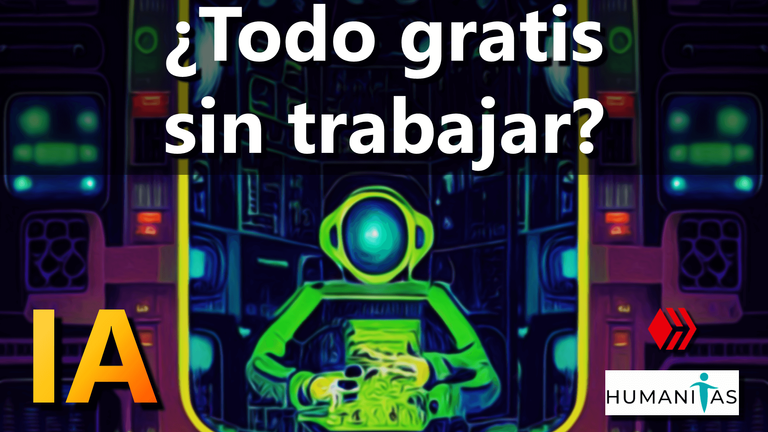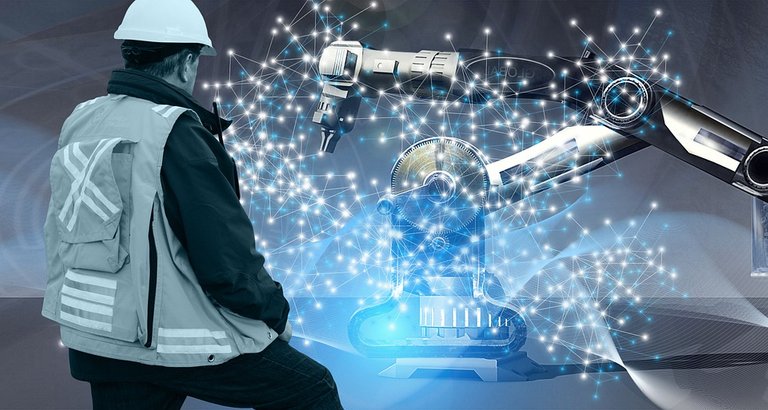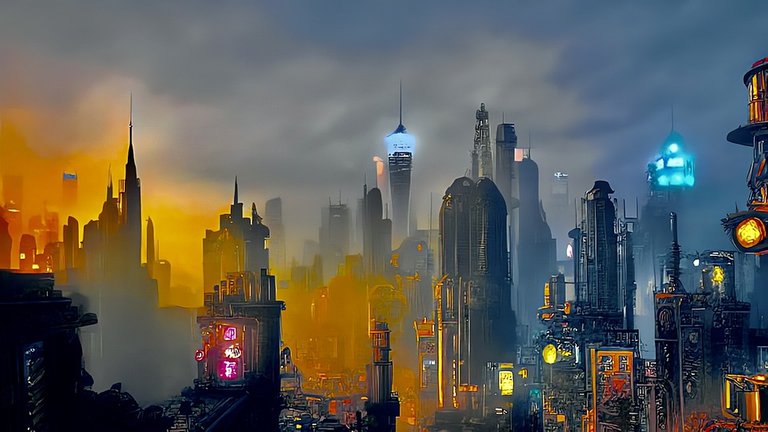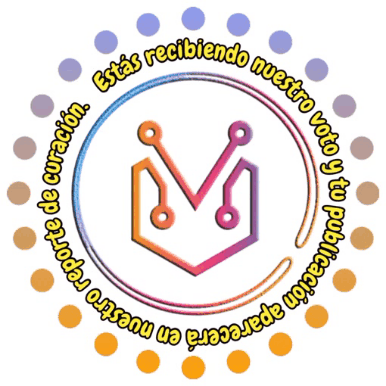Quizás esta sea una de las formas más inesperadas de abordar el tema de la inteligencia artificial. Estas dos semanas en Humanitas hemos preparado una iniciativa acerca de la Inteligencia Artificial y el Ser Humano, anímate a participar en el siguiente enlace:
Este es el enlace de la iniciativa: Iniciativa: El Ser Humano y la Inteligencia Artificial (IA). En la comunidad Humanitas.

Tenía pensado hablar de este tema desde un enfoque más general, pero, hace poco, vi un video que me hizo pensar acerca de lo que podría suceder en un futuro si esta tecnología se desarrolla y de alguna manera se usa para satisfacer todas las necesidades del ser humano. Es decir, suponiendo que el uso de esta tecnología no se desvía para propósitos oscuros o negativos para el ser humano, lo cual también es una posibilidad.
Esto sería una especie de utopía que de alguna manera pareciera ser posible ahora que la inteligencia artificial se ha desarrollado al nivel que lo ha hecho hasta ahora. Dentro de 50 años, podríamos vivir en un mundo radicalmente distinto al actual gracias a la tecnología.
Desde que Marx compartió sus escritos acerca del comunismo, una gran cantidad de intelectuales se han fijado y maravillado por sus ideas. Y podría decirse que actualmente hay muchas personas que aún sin definirse como comunistas abogan por un mundo donde muchas cosas sean totalmente gratuitas. El gran problema es que el método para lograrlo ha sido muchas veces infructuoso y ha terminado generando el efecto contrario o sociedades más pobres y menos desarrolladas. Además, el conflicto entre distintas formas de pensar ideológicas siempre ha hecho parecer que nunca van a coincidir entre sí.
Sin embargo, con esto de la IA y el futuro que podría traernos, podríamos decir que el comunismo tenía razón en el fin y el capitalismo tenía razón en el método. Bueno, algo así.
Gracias al avance tecnológico, en conjunto con el sistema de libre mercado (aplicado adecuadamente), se ha logrado que existan hoy cosas prácticamente gratis y muy baratas, accesibles para todos. Por ejemplo, el agua potable es algo de fácil acceso para casi cualquier persona que viva en un país relativamente desarrollado. Un teléfono inteligente, el acceso a internet, son cosas que cada día se van haciendo más accesibles en todo el mundo. Un tiempo atrás eran un lujo, pero ya no.

Lo que la IA puede causar es que las empresas que antes necesitaban humanos para muchas de sus tareas ahora puedan hacerlo de manera más eficiente y más barata con robots o programas de inteligencia artificial. Es decir, el costo para producir algo sería mucho más barato, y será más barato a medida que la IA se vuelva más potente y más accesible a todos (al igual que el internet se fue volviendo más accesible a todos con los años).
Imagínate que la comida se vuelva tan fácil y barata de producir que se vuelva prácticamente gratis ¿Trabajarías? Es decir, existe esta idea o miedo de que la IA sustituya a los humanos y nos quedemos sin trabajo y, por lo tanto, no tengamos medios para generar dinero y subsistir. Pero también podría suceder que no tengamos que trabajar tanto, que todas las necesidades básicas estén cubiertas gracias a lo baratas que son, y que los que quieran tener lujos son los que más trabajarían para obtenerlos.
En Venezuela, recordamos aquellos tiempos donde había cosas que se regalaban, debido a lo barato que eran, al punto de que era más práctico regalarlas que venderlas. La diferencia con la IA será que lo barato se deberá a la eficiencia del libre mercado y la tecnología, y no a “vivir relajado” por tener mucho petróleo.
Imagina entonces que las necesidades básicas estén cubiertas por lo fácil que es producirla, trabajaríamos menos, y con más tiempo libre podríamos ser “poetas, músicos, filósofos, artistas...” todo eso que se propone en la ideología del comunismo una vez que se llegue a su fase final. La única diferencia es que el modo de llegar allí es mediante el capitalismo de libre mercado, es decir, pareciera que en el fondo ambas ideologías se complementaran de una manera extraña.

Todo lo escrito arriba es bastante optimista y utópico. Puede que en el camino nos encontremos con muchas dificultades o quizás la IA no logre disminuir del todo la pobreza en el mundo. Pero sin duda que ha llegado para cambiar muchas cosas y algún efecto importante tendrá. En su tiempo, la revolución industrial y las máquinas generaron cierto malestar por los trabajos que la gente perdió y los que ahora se hacían en fábricas. Pero, hoy en día, los beneficios de ello son muy grandes. Quizás en aquella época se necesitó más consciencia humana para evitar la explotación y otros problemas, pero el mal en sí no eran las máquinas.
En la historia ha habido algunas referencias parecidas a la IA moderna. El mito griego de Talos era el de un gigante de bronce autómata que protegía la Isla de Creta de invasores. Algunos científicos de la antigüedad sin duda que estarían maravillados con la IA, aunque algunos de ellos podrían tenerle algo de miedo. De hecho, algunos creadores actuales de herramientas IA han decidido apagar sus creaciones por cosas que dan realmente un poco de miedo.
Creo que la IA representa tanto algo positivo como negativo para el ser humano, depende de nosotros darle el mejor uso posible. Deberemos adaptarnos ya que la evolución de la tecnología no se puede parar. Nuestro valor como seres humanos se determina por nuestra capacidad de razonar, pensar, crear, cosas que van más allá de una profesión o labor que de pronto quedó obsoleta.
Otro escenario, en este caso distópico, es que la IA genere una gran masa de personas a nivel mundial que no trabajen, que sean felices pero que no tienen nada, y que los más poderosos, dueños de la tecnología, acumulen una riqueza y poder abismal. Bueno, esperemos que el futuro se parezca más al de más arriba.
Gracias por leer. Invito a participar en la iniciativa aún activa de la comunidad Humanitas a @maryed @irvinc @liveofdalla @pelulacro
@m16uellop @hannymarchan @mercmarg @audiarmisg @emiliomoron @madridbg @rnunez09 @rbalzan79 @eniolw @maria1989 @bertrayo @chaodietas

Perhaps this is one of the most unexpected ways to approach the topic of artificial intelligence. These two weeks in Humanitas we have prepared an initiative about Artificial Intelligence and the Human Being, encourage you to participate in the following link:
This is the link of the initiative: Initiative: The Human Being and Artificial Intelligence (AI). In the Humanitas community.
I was planning to talk about this topic from a more general approach, but, recently, I saw a video that made me think about what could happen in the future if this technology is developed and somehow used to satisfy all human needs. That is, assuming that the use of this technology is not diverted for dark or negative purposes for human beings, which is also a possibility.
This would be a kind of utopia that somehow seems to be possible now that artificial intelligence has developed to the level it has so far. Fifty years from now, we could be living in a radically different world than we do today thanks to technology.
Ever since Marx shared his writings about communism, a great many intellectuals have been fixated and amazed by his ideas. And it could be said that nowadays there are many people who, even without defining themselves as communists, advocate a world where many things are totally free. The big problem is that the method to achieve this has often been unsuccessful and has ended up generating the opposite effect or poorer and less developed societies. In addition, the conflict between different ideological ways of thinking has always made it seem that they will never coincide with each other.
However, with this AI thing and the future it could bring us, we could say that communism was right in the end and capitalism was right in the method. Well, sort of.
Thanks to technological progress, in conjunction with the free market system (properly applied), there are now things that are practically free and very cheap, accessible to everyone. For example, drinking water is something easily accessible to almost anyone living in a relatively developed country. A smart phone, access to the Internet, are things that are becoming more accessible every day all over the world. Once upon a time they were a luxury, but not anymore.

What AI may cause is that companies that used to need humans for many of their tasks will now be able to do it more efficiently and more cheaply with robots or artificial intelligence programs. That is, the cost to produce something would be much cheaper, and it will get cheaper as AI becomes more powerful and more accessible to everyone (just as the internet became more accessible to everyone over the years).
Imagine if food becomes so easy and cheap to produce that it becomes practically free Would you work? I mean, there is this idea or fear that AI will replace humans and we will become unemployed and therefore have no means to generate money and subsist. But it could also happen that we do not have to work so much, that all basic needs are covered thanks to how cheap they are, and that those who want to have luxuries are the ones who would work the hardest to obtain them.
In Venezuela, we remember those times where there were things that were given away, because of how cheap they were, to the point that it was more practical to give them away than to sell them. The difference with AI will be that the cheapness will be due to the efficiency of the free market and technology, and not to "living relaxed" because of having a lot of oil.
Imagine then that basic needs are covered by how easy it is to produce it, we would work less, and with more free time we could be "poets, musicians, philosophers, artists..." all that is proposed in the ideology of communism once it reaches its final stage. The only difference is that the way to get there is through free market capitalism, that is, it seems that in the end both ideologies complement each other in a strange way.

Everything written above is quite optimistic and utopian. We may encounter many difficulties along the way, or perhaps AI will not be able to completely reduce poverty in the world. But it has undoubtedly arrived to change many things and it will have some important effect. In its time, the industrial revolution and machines generated some unease about the jobs that people lost and the jobs that were now done in factories. But, today, the benefits of it are very great. Perhaps at that time more human consciousness was needed to avoid exploitation and other problems, but the evil itself was not the machines.
In history there have been some similar references to modern AI. The Greek myth of Talos was that of an automaton bronze giant protecting the Island of Crete from invaders. Some ancient scientists would no doubt be in awe of AI, although some of them might be a little afraid of it. In fact, some current creators of AI tools have decided to turn off their creations for things that are actually a bit scary.
I believe that AI represents both a positive and a negative for humans, it is up to us to make the best use of it. We will have to adapt as the evolution of technology cannot be stopped. Our value as human beings is determined by our ability to reason, think, create, things that go beyond a profession or job that suddenly became obsolete.
Another scenario, in this case dystopian, is that AI generates a great mass of people worldwide who do not work, who are happy but have nothing, and that the most powerful, owners of technology, accumulate abysmal wealth and power. Well, let's hope the future looks more like the one above.
Translated to English language with the help of DeepL.com
Otras redes sociales:
 |
 |
 |
F1 & motorsports: @acontmotor
Secondary blog: @acontblog

| ¡Gracias por visitar! — ¡Thanks for visiting!  |




